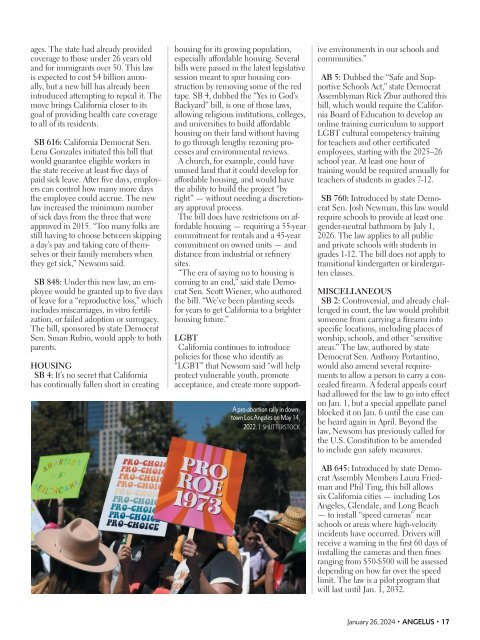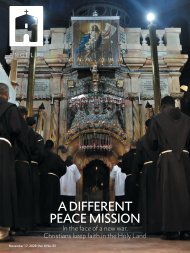Angelus News | January 26, 2024 | Vol. 9 No. 2
On the cover: High school student Atticus Maldonado smiles between classes at St. Pius X-St. Matthias Academy in Downey. On Page 10, Angelus contributor Steve Lowery has the incredible story of how Maldonado’s school community rallied behind him in prayer — and why his unlikely recovery from a rare cancer may not even be the story’s biggest miracle.
On the cover: High school student Atticus Maldonado smiles between classes at St. Pius X-St. Matthias Academy in Downey. On Page 10, Angelus contributor Steve Lowery has the incredible story of how Maldonado’s school community rallied behind him in prayer — and why his unlikely recovery from a rare cancer may not even be the story’s biggest miracle.
You also want an ePaper? Increase the reach of your titles
YUMPU automatically turns print PDFs into web optimized ePapers that Google loves.
ages. The state had already provided<br />
coverage to those under <strong>26</strong> years old<br />
and for immigrants over 50. This law<br />
is expected to cost $4 billion annually,<br />
but a new bill has already been<br />
introduced attempting to repeal it. The<br />
move brings California closer to its<br />
goal of providing health care coverage<br />
to all of its residents.<br />
SB 616: California Democrat Sen.<br />
Lena Gonzales initiated this bill that<br />
would guarantee eligible workers in<br />
the state receive at least five days of<br />
paid sick leave. After five days, employers<br />
can control how many more days<br />
the employee could accrue. The new<br />
law increased the minimum number<br />
of sick days from the three that were<br />
approved in 2015. “Too many folks are<br />
still having to choose between skipping<br />
a day’s pay and taking care of themselves<br />
or their family members when<br />
they get sick,” <strong>News</strong>om said.<br />
SB 848: Under this new law, an employee<br />
would be granted up to five days<br />
of leave for a “reproductive loss,” which<br />
includes miscarriages, in vitro fertilization,<br />
or failed adoption or surrogacy.<br />
The bill, sponsored by state Democrat<br />
Sen. Susan Rubio, would apply to both<br />
parents.<br />
HOUSING<br />
SB 4: It’s no secret that California<br />
has continually fallen short in creating<br />
housing for its growing population,<br />
especially affordable housing. Several<br />
bills were passed in the latest legislative<br />
session meant to spur housing construction<br />
by removing some of the red<br />
tape. SB 4, dubbed the “Yes in God’s<br />
Backyard” bill, is one of those laws,<br />
allowing religious institutions, colleges,<br />
and universities to build affordable<br />
housing on their land without having<br />
to go through lengthy rezoning processes<br />
and environmental reviews.<br />
A church, for example, could have<br />
unused land that it could develop for<br />
affordable housing, and would have<br />
the ability to build the project “by<br />
right” — without needing a discretionary<br />
approval process.<br />
The bill does have restrictions on affordable<br />
housing — requiring a 55-year<br />
commitment for rentals and a 45-year<br />
commitment on owned units — and<br />
distance from industrial or refinery<br />
sites.<br />
“The era of saying no to housing is<br />
coming to an end,” said state Democrat<br />
Sen. Scott Wiener, who authored<br />
the bill. “We’ve been planting seeds<br />
for years to get California to a brighter<br />
housing future.”<br />
A pro-abortion rally in downtown<br />
Los Angeles on May 14,<br />
2022. | SHUTTERSTOCK<br />
LGBT<br />
California continues to introduce<br />
policies for those who identify as<br />
“LGBT” that <strong>News</strong>om said “will help<br />
protect vulnerable youth, promote<br />
acceptance, and create more supportive<br />
environments in our schools and<br />
communities.”<br />
AB 5: Dubbed the “Safe and Supportive<br />
Schools Act,” state Democrat<br />
Assemblyman Rick Zbur authored this<br />
bill, which would require the California<br />
Board of Education to develop an<br />
online training curriculum to support<br />
LGBT cultural competency training<br />
for teachers and other certificated<br />
employees, starting with the 2025–<strong>26</strong><br />
school year. At least one hour of<br />
training would be required annually for<br />
teachers of students in grades 7-12.<br />
SB 760: Introduced by state Democrat<br />
Sen. Josh Newman, this law would<br />
require schools to provide at least one<br />
gender-neutral bathroom by July 1,<br />
20<strong>26</strong>. The law applies to all public<br />
and private schools with students in<br />
grades 1-12. The bill does not apply to<br />
transitional kindergarten or kindergarten<br />
classes.<br />
MISCELLANEOUS<br />
SB 2: Controversial, and already challenged<br />
in court, the law would prohibit<br />
someone from carrying a firearm into<br />
specific locations, including places of<br />
worship, schools, and other “sensitive<br />
areas.” The law, authored by state<br />
Democrat Sen. Anthony Portantino,<br />
would also amend several requirements<br />
to allow a person to carry a concealed<br />
firearm. A federal appeals court<br />
had allowed for the law to go into effect<br />
on Jan. 1, but a special appellate panel<br />
blocked it on Jan. 6 until the case can<br />
be heard again in April. Beyond the<br />
law, <strong>News</strong>om has previously called for<br />
the U.S. Constitution to be amended<br />
to include gun safety measures.<br />
AB 645: Introduced by state Democrat<br />
Assembly Members Laura Friedman<br />
and Phil Ting, this bill allows<br />
six California cities — including Los<br />
Angeles, Glendale, and Long Beach<br />
— to install “speed cameras” near<br />
schools or areas where high-velocity<br />
incidents have occurred. Drivers will<br />
receive a warning in the first 60 days of<br />
installing the cameras and then fines<br />
ranging from $50-$500 will be assessed<br />
depending on how far over the speed<br />
limit. The law is a pilot program that<br />
will last until Jan. 1, 2032.<br />
<strong>January</strong> <strong>26</strong>, <strong>2024</strong> • ANGELUS • 17

















